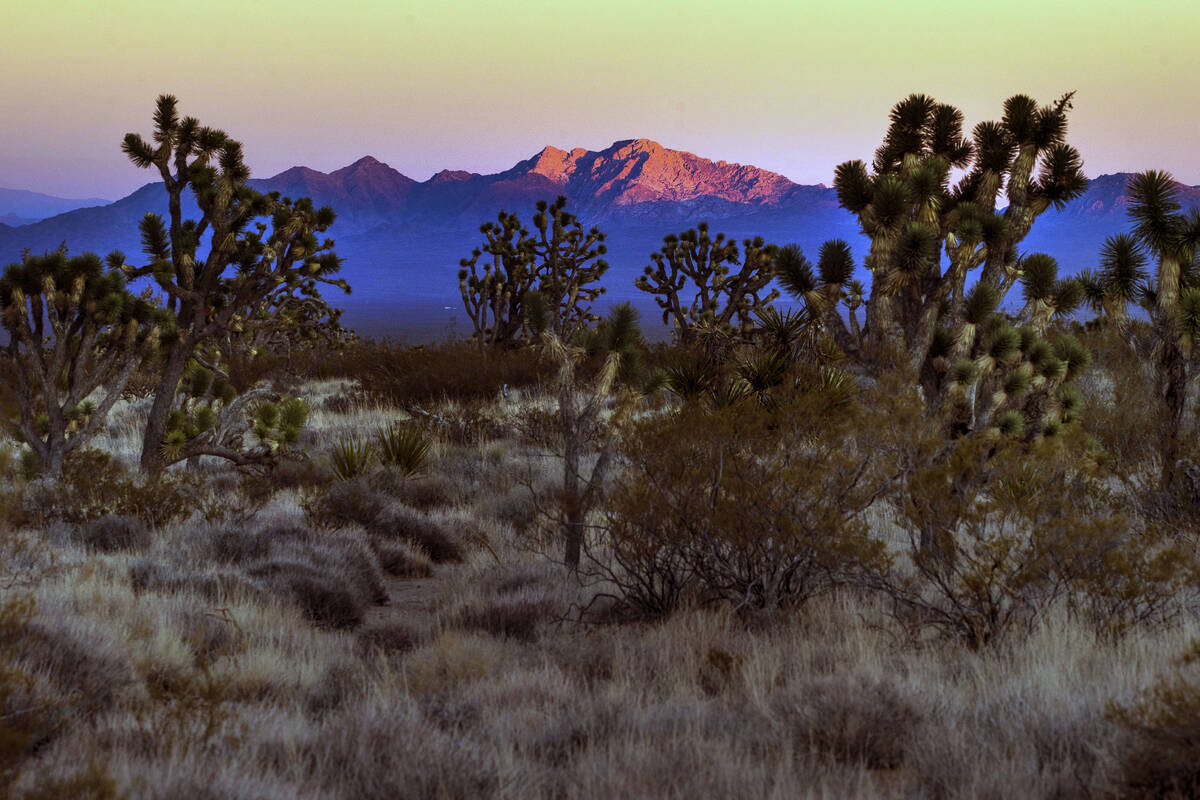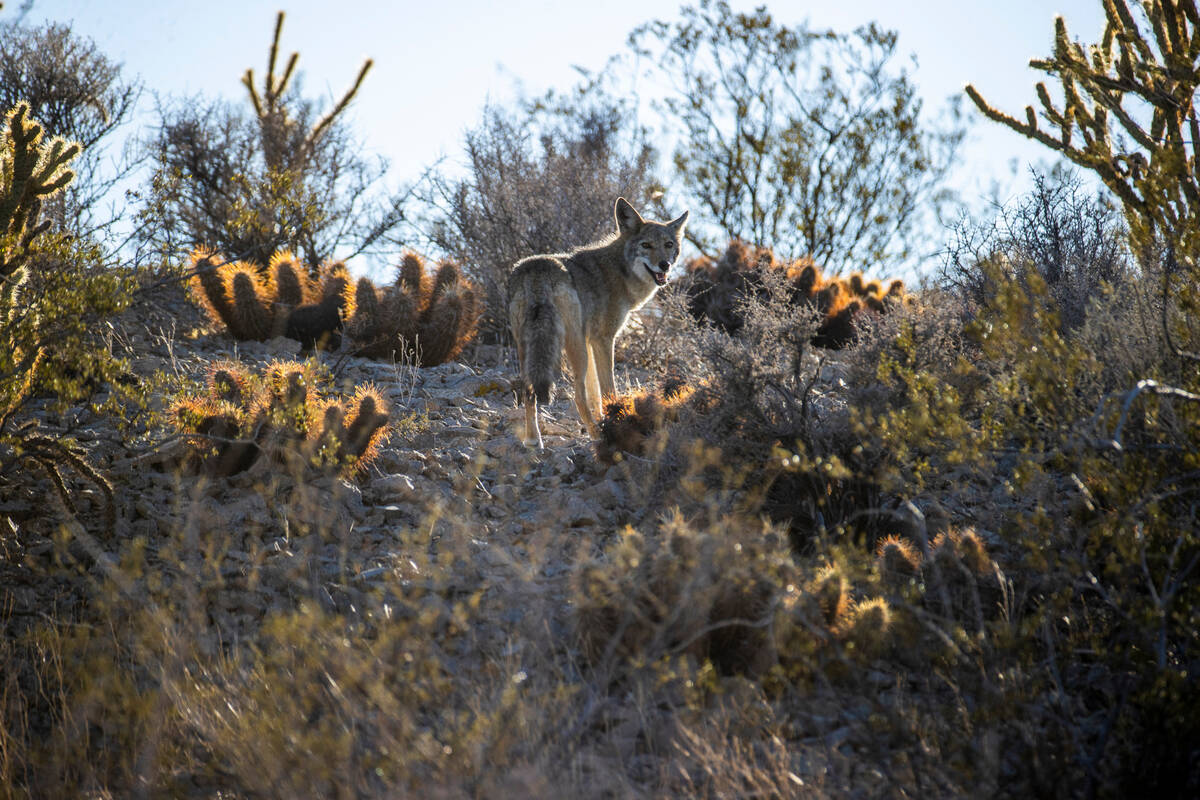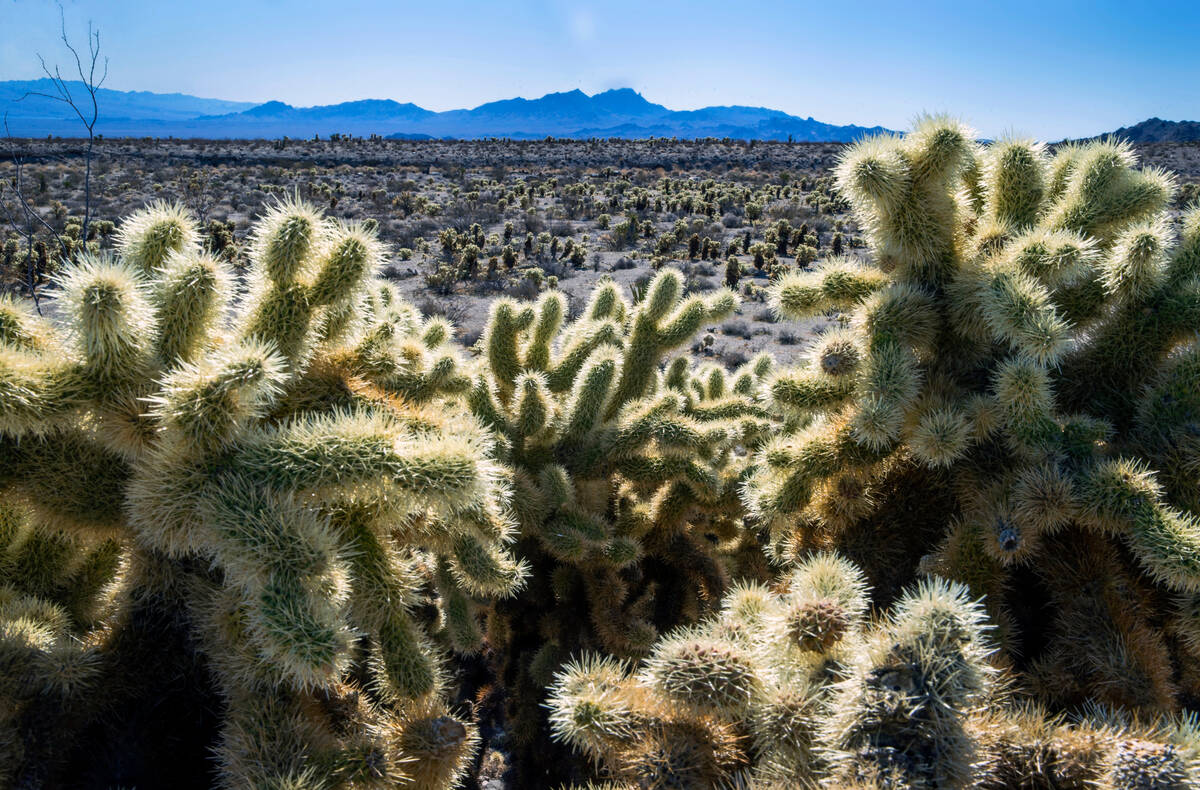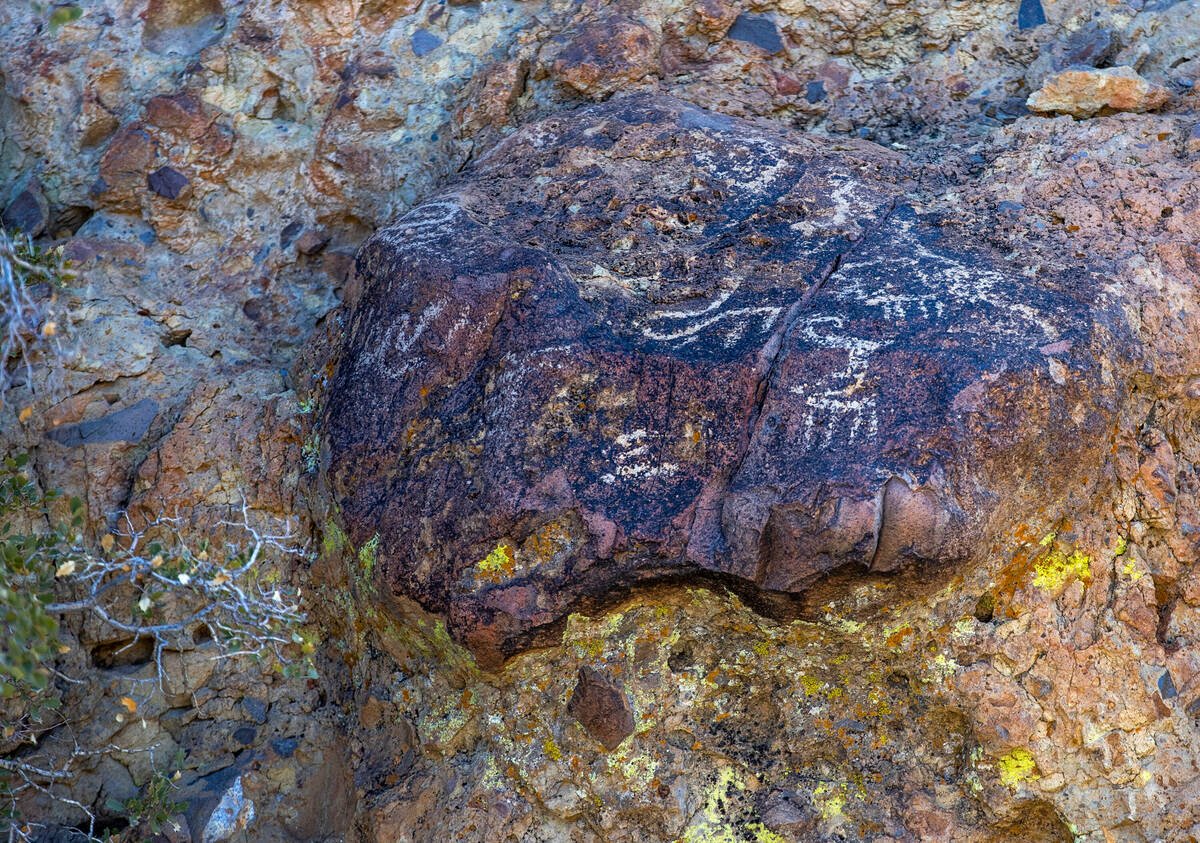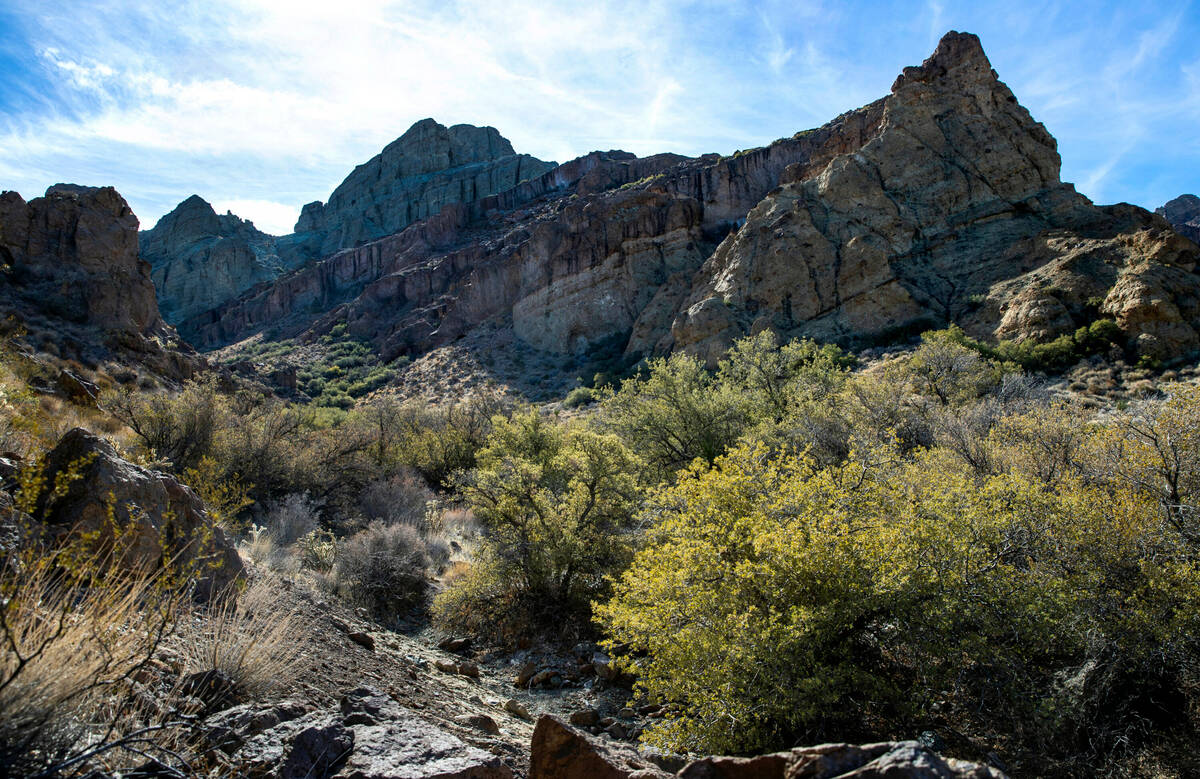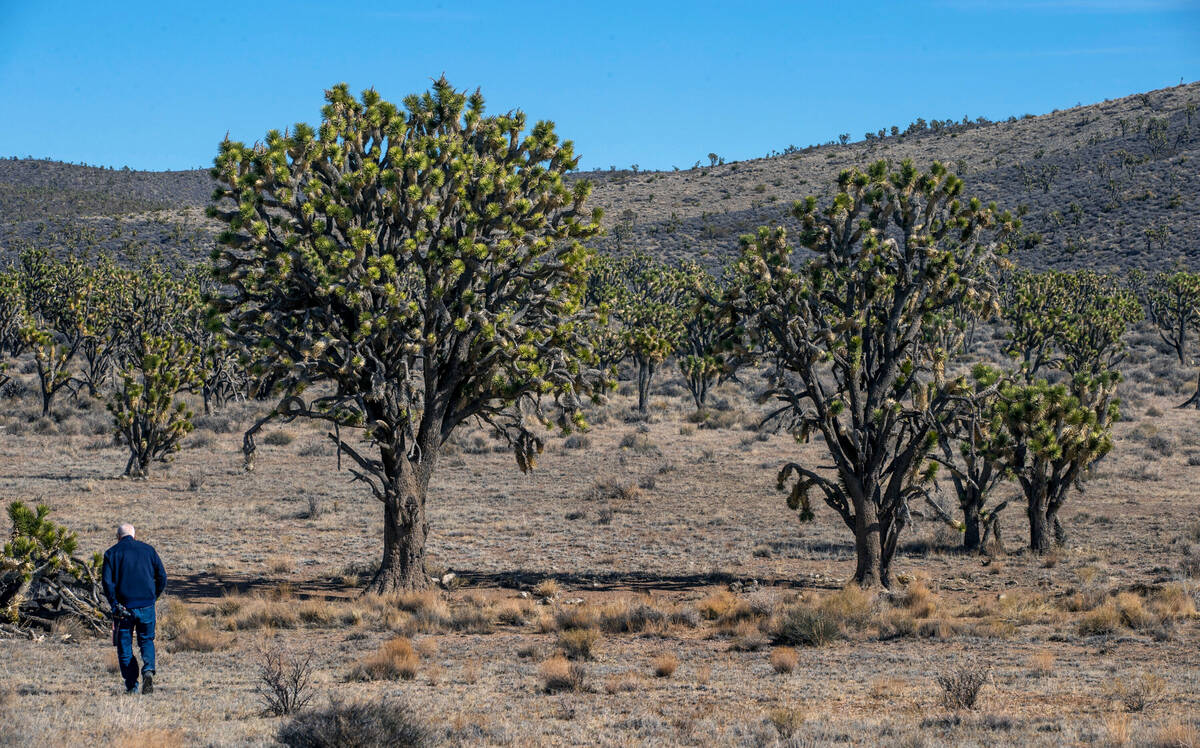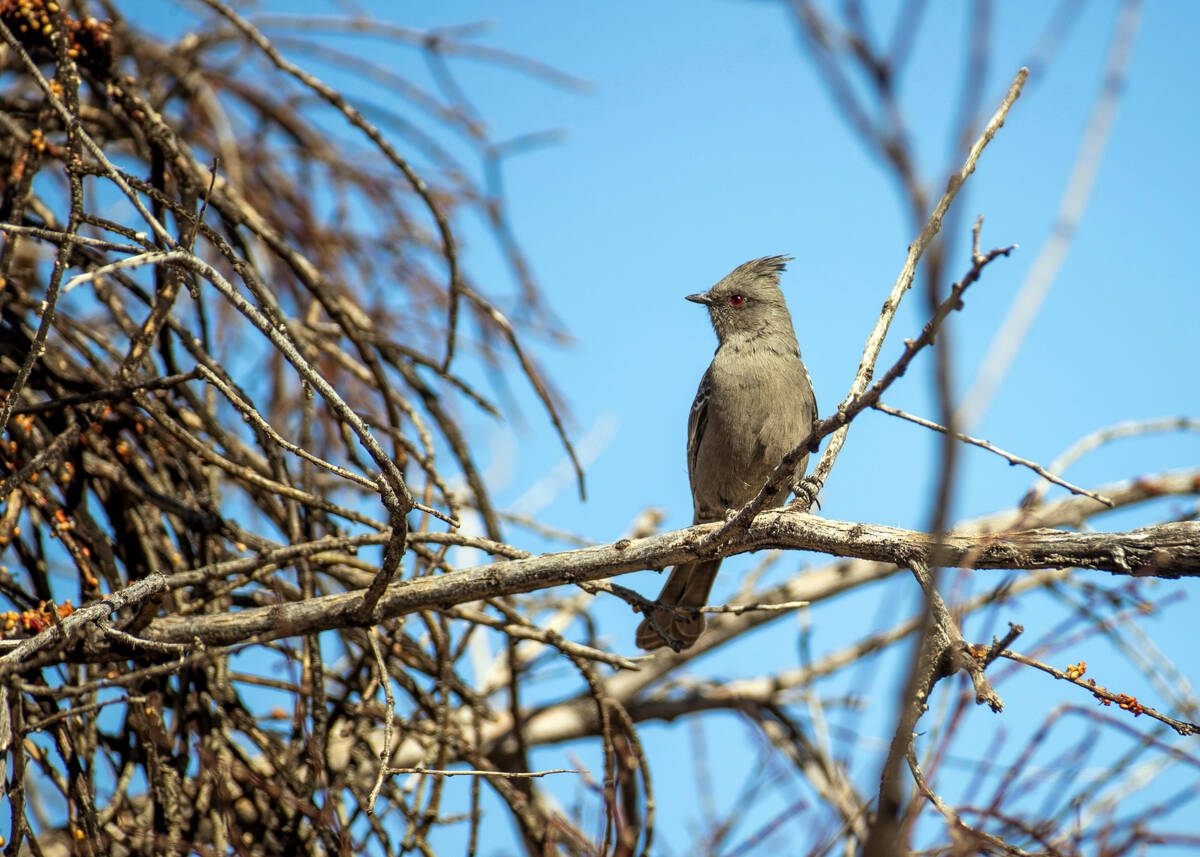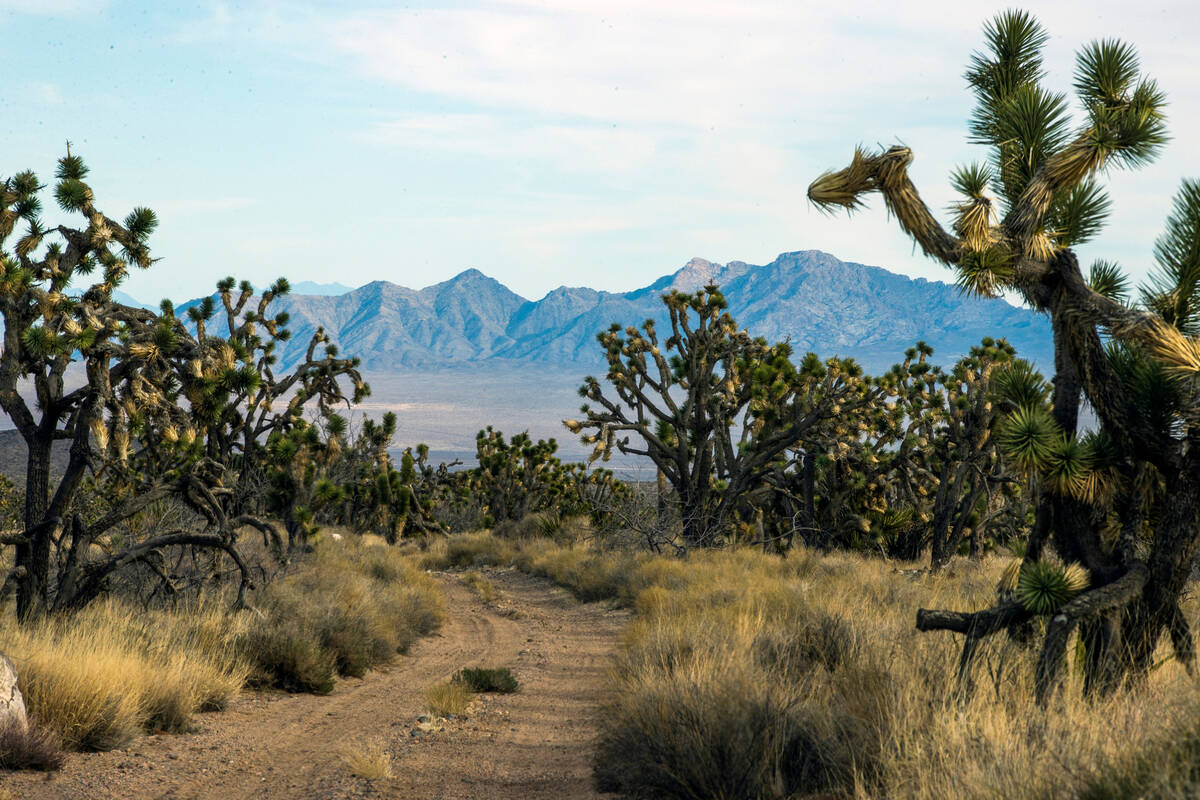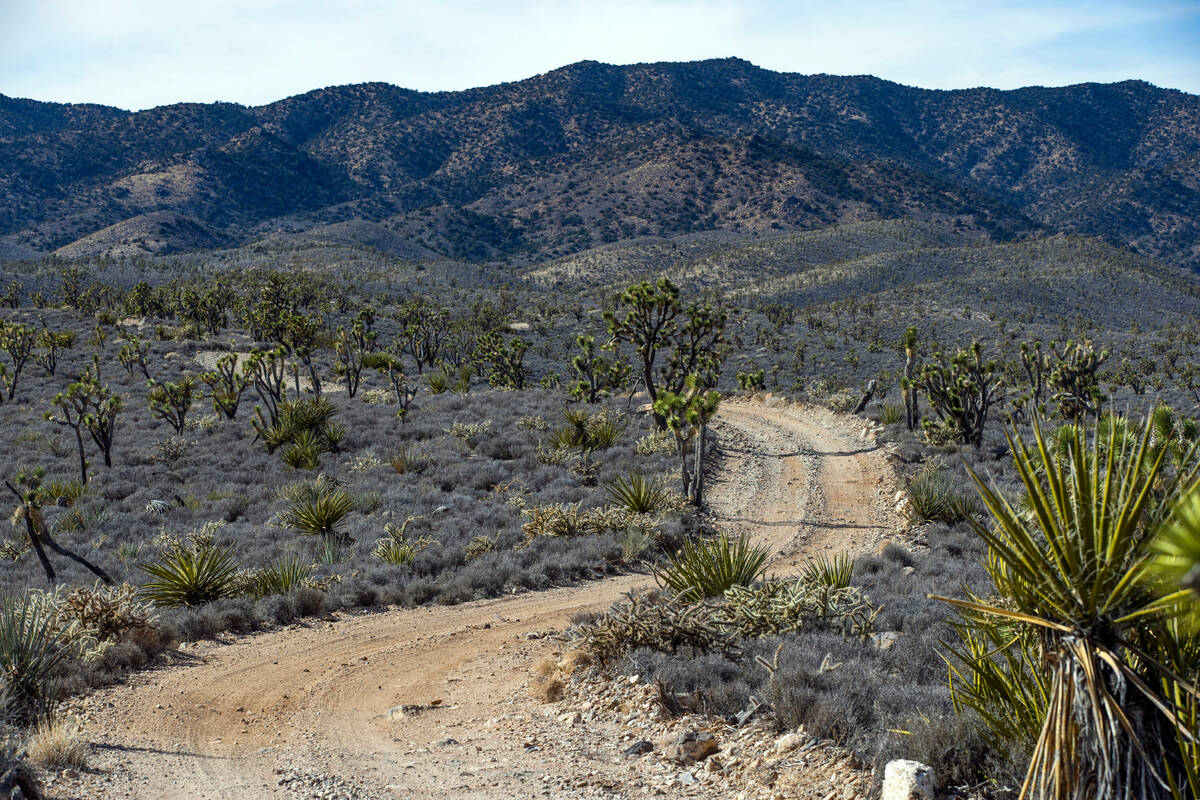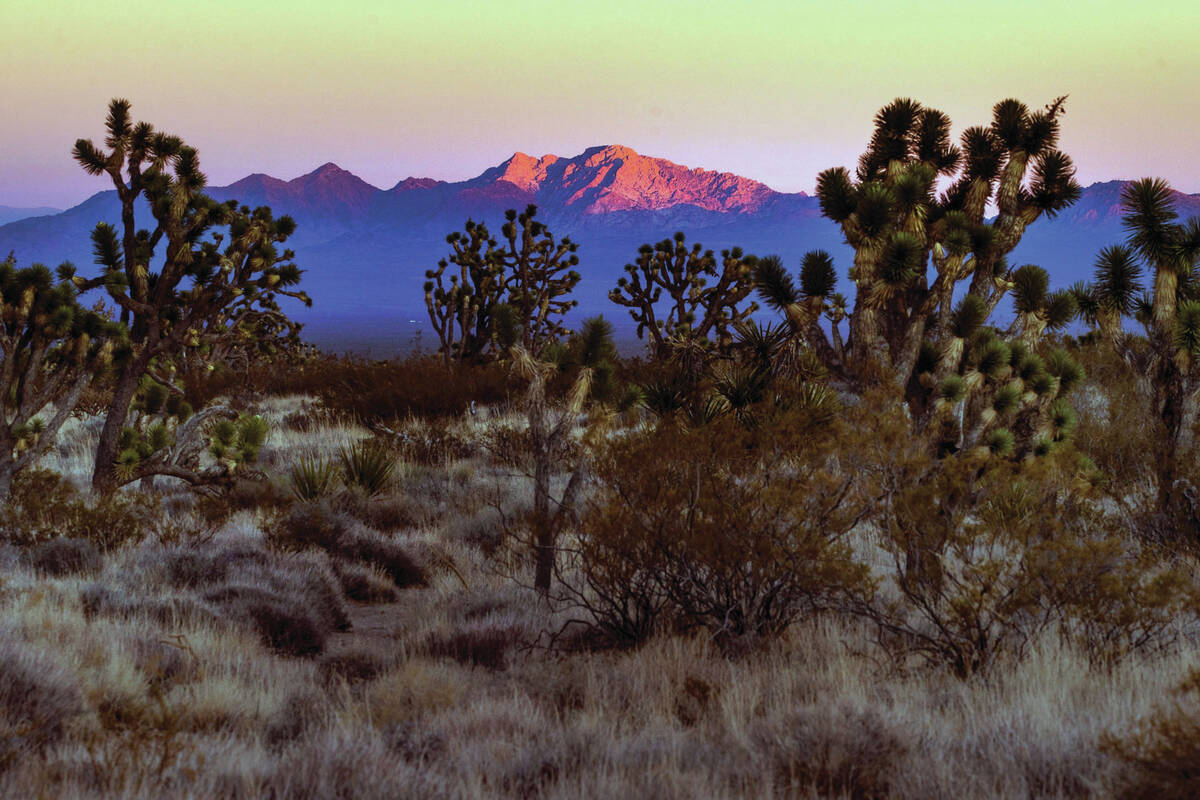Avi Kwa Ame to be Nevada’s next national monument, Biden promises
Nevada’s Avi Kwa Ame, meaning “Spirit Mountain” in Mojave, will become a national monument, President Joe Biden announced Wednesday at his White House Tribal Nations Summit.
Tribes, conservationists and outdoor recreation enthusiasts have worked for years to protect the area in Southern Nevada. The Avi Kwa Ame Coalition leading the effort calls for 450,000 acres of land stretching from the Newberry mountains in the east to the New York, South McCullough, Castle and Piute mountains in the west to be protected and preserved for future generations from development.
Groups that have spearheaded the effort thanked Biden for his plans and urged him to designate the area immediately and without alterations to the plans and its proposed boundaries.
“We ask that the Biden administration now keep its promise to tribal nations and designate Avi Kwa Ame immediately. We have been disappointed by broken promises from the federal government before,” said Taylor Patterson, executive director of Native Voters Alliance Nevada and member of the Avi Kwa Ame Coalition.
Added Annette Magnus, executive director of the Institute for a Progressive Nevada: “This monument and its proposed boundaries are something that Tribes and their leadership have been organizing around for years. To not respect this proposal would fly in the face of what this week’s summit in Washington, D.C., aims to achieve.”
Avi Kwa Ame — pronounced “AH-vee-qua-MAY” — is host to picturesque views, winding dirt roads and geological features that locals use for outdoor recreational activities like hiking, hunting and off-road driving. The public lands are also home to Joshua trees, petroglyphs and threatened wildlife such as the Mojave Desert tortoise and the desert bighorn sheep. Spirit Mountain itself is located on the eastern boundary of the 450,000-acre national monument and is designated as a traditional cultural property on the National Register of Historic Places.
For Native American tribes in the area, Avi Kwa Ame plays an even more special role, as it is considered a sacred area that tribes have lived on for centuries and must be preserved for future generations.
Native cultural significance
The Fort Mojave Tribe is one of about a dozen Yuman-speaking tribes that have traced their origins to Avi Kwa Ame. According to the tribe’s creation story, their creator placed them on the land to care for it.
“It’s our place of creation. Avi Kwa Ame is a place where we make the connection to the land, the place where we make connection to the water,” said Fort Mojave Chairman Timothy Williams. “It’s definitely a place of spiritual importance.”
For other tribes, while Avi Kwa Ame is not part of a creation story, the area served as an important place in their history. Southern Paiute tribes that live in California, Nevada, Utah and Arizona recorded their “life cycle” in what is called the “salt songs,” Patterson said, which tell the story of the southern Paiute people and their journey through the Colorado Plateau.
“Avi Kwa Ame is part of that route,” Patterson said. “This isn’t just indigenous history. This is human history. We’re talking about the earliest settlements in Nevada … a place that was seen as uninhabitable, our people have lived there for centuries.”
With development taking place throughout the country, especially in Southern Nevada, it was important to the Fort Mojave Tribe to keep Avi Kwa Ame pristine.
“To keep the land pure, in a sense that it doesn’t see the development when it comes to the renewables that are coming out there,” Williams said, not just for the general public to enjoy but also to maintain that spiritual connection for the tribe.
Williams said that it has been a long road for past tribal leaders and members. The tribe has worked to protect the site starting in the 1990s when it pushed for the mountain and its surrounding 48,000 acres to be designated as a traditional cultural property.
“The Fort Mojave Tribal Council and members have put in a lot of time and effort in doing what we can to protect our land,” Williams said.
In February, Rep. Dina Titus, D-Nev.,spearheaded legislation in the House of Representatives pushing for Avi Kwa Ame’s national monument designation. The Avi Kwa Ame National Monument Establishment Act of 2022 was introduced in February as one route to get the national monument designation. The other path is through a presidential executive order under the Antiquities Act of 1906.
“Preserving treasured spaces has always been important to me, and I am grateful for the many grassroots organizations and community leaders who have been instrumental over the years in safeguarding these sloping bajadas, scenic canyons, and ancient cultural sites for future generations to enjoy,” Titus said in a statement.
Developments thwarted?
If the current plan is approved with the proposed boundaries, no development would be allowed in the 450,000 acres. This would thwart a couple of proposed projects from renewable energy companies, including a solar project proposed by Avantus and a 68 wind-turbine farm called the Kulning Wind Project proposed by Crescent Peak Renewables.
It is possible Biden could change the boundaries that have been proposed to allow a project to go forward, but multiple organizations and government departments, including the Department of Interior, have worked for years on determining the boundaries of the national monument, Titus said.
Projects could go in many other areas of Nevada instead of this sacred land, Titus said. The solar farm proposal is also at its very beginning stages of planning and has not gone before the Bureau of Land Management yet, Titus said, “so it’s not like we’re taking away anything.”
The company said in a statement it supports the monument and that it’s project would affect a very small portion of the area.
“Avantus supports the creation of the Avi Kwa Ame National Monument, an important step to protecting Nevada’s culturally significant lands and honoring the state’s many Native communities,” the statement says. “We continue to work closely with federal, state and local officials and Tribal communities on the development of our projects, and we reiterate our commitment to responsible clean energy development that creates good paying jobs and opportunities to join the clean energy transition.”
The company’s statement says the project “was carefully sited on federal land to avoid biological and cultural resources and utilize existing roads and transmission infrastructure,” and just 2,000 acres of the 450,000-acre proposed monument overlap. The solar project would connect to the existing Mohave Generation substation, taking advantage of its transmission lines to Nevada, California and Arizona to avoid building new infrastructure without disturbing more of the desert.
“We must address climate change to permanently preserve the special characteristics of the land,” Avantus added.
The company behind the Kulning Wind Energy Project supports preserving lands for future generations and respecting the rich cultural heritage of the area, said Ed Duggan, senior director of Wind Origination and Development for Eolus North America Inc., in a statement.
But he said the company hopes Biden will “see the wisdom” of carving out areas for “critical wind, solar and rare earth mining activities that can coexist with the new monument.
“These carve outs would allow critical mineral and energy extraction that facilitates our transition to 100% renewable green energy. This would allow the Kulning Wind Energy Project to provide enough clean energy to power over 100,000 Nevada homes and would inject that energy into the grid very near the water-starved Hoover Dam,” Duggan said.
Clark County also released a statement of support, but hinted that officials are concerned about how the designation would affect the airport.
“Clark County recognizes the great significance of the Avi Kwa Ame region to tribal communities as well as conservationists,” the statement reads. “We continue to work with stakeholders at the federal level to ensure that while we are protecting these lands, we are also advocating for the future operational abilities of Harry Reid International Airport as well as our other important economic institutions. We support the efforts to maintain the beauty of this sacred land.”
Titus expects Biden to finalize the plans for the national monument designation soon after the holidays. He, along with Interior Secretary Deb Haaland, the first Native American to serve as a cabinet secretary who also pushed for Avi Kwa Ame’s designation, are expected to come out to the site for the official signing.
“It will be quite a celebration,” Titus said.
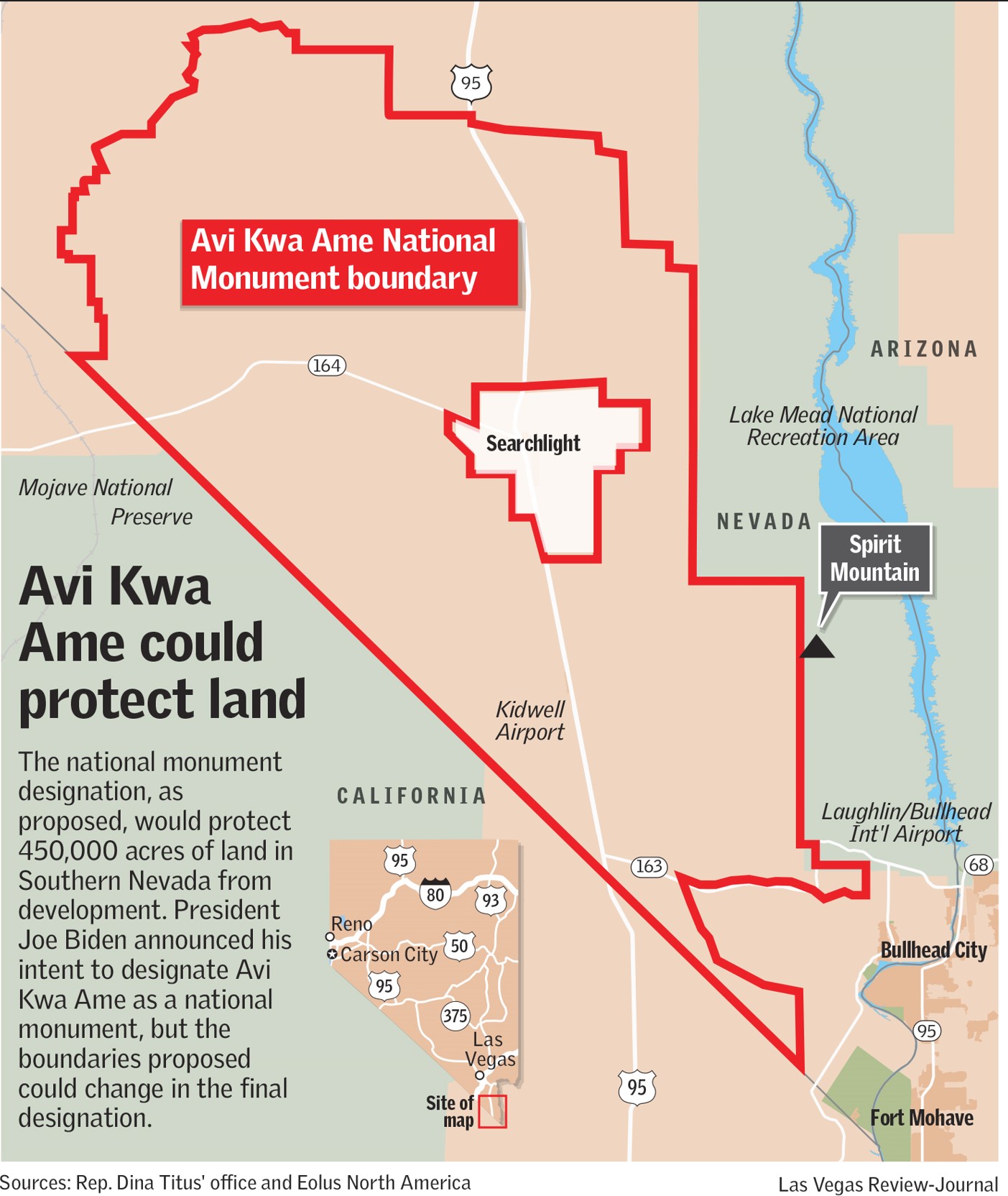
Economic benefits
Advocates for the national monument designation have stressed that it would bring more tourists interested in outdoor recreation through the small communities that Avi Kwa Ame surrounds, such as Searchlight and Cal-Nev-Ari. The Boulder City Chamber of Commerce, which supported the designation, sees it as an opportunity to invite tourists to the area to learn more about “exploring, discovering and unwinding in the unspoiled Avi Kwa Ame,” said CEO Jill Lagan in a statement.
“We invest in this land not only because it is the right thing to do for future generations, but it is truly the prudent financial move as well. Nevada’s outdoor recreation economy supports 49,000 jobs and generates $3.9 billion for the state in annual economic activity,” said Clark County Commissioner Michael Naft, who introduced a resolution of support for the designation, in a statement.
After Biden made the announcement Wednesday morning, Nevada politicians, organization leaders and others thanked him for his plans to preserve the public lands.
U.S. Sen. Jacky Rosen, D-Nev., who was at the White House Tribal Nations Summit on Wednesday, applauded Biden’s plan to designate Avi Kwa Ame as the newest national monument.
“Establishing a new National Monument at Avi Kwa Ame will safeguard an area of cultural importance to Tribal nations that is rich with wildlife and incredible natural beauty,” Rosen said in a statement.
Gov. Steve Sisolak thanked Biden and the Department of Interior for working with tribal leaders, conservationists and others to protect Spirit Mountain.
“Designating this portion of Southern Nevada as a national monument and providing for appropriate management will ensure we will continue to preserve our rich cultural history and protect our rare and threatened wildlife,” Sisolak said in a statement.
The area contains some of the “most stunning landscapes in Nevada,” said U.S. Sen. Catherine Cortez Masto, D-Nev., in a statement, adding that she looks forward to celebrating the official designation of Nevada’s next national monument.
“We applaud President Biden and Secretary Haaland for listening to the broad coalition of Indigenous leaders, ranchers, hunters, and conservationists who have been calling for national monument designation,” said Collin O’Mara, president and CEO of the National Wildlife Federation in a statement.
“The lands and waters we protect help tell and teach the story of our country,” said Craig Bakerjian, Nevada Conservation League’s Avi Kwa Ame campaign manager. “The Avi Kwa Ame National Monument will contribute to a narrative of an America that protects culturally, biologically, historically, and economically important landscapes for our communities, and especially honors the stories of Indigenous communities which have often been denied historical recognition.”
Contact Jessica Hill at jehill@reviewjournal.com. Follow @jess_hillyeah on Twitter.
RELATED
UNLV museum exhibit dedicated to proposed Avi Kwa Ame National Monument
Nevada's newest monument? Proponents want it to be Avi Kwa Ame.
Proposed monument would protect southern Clark County lands



